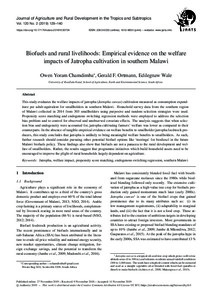Aufsatz

Biofuels and livelihoods: Empirical findings on the welfare impacts of Jatropha cultivation in the Mangochi district, Southern Malawi
Zusammenfassung
This study evaluates the welfare impacts of jatropha (Jatropha carcus) cultivation measured as consumption expenditure per adult-equivalent for smallholders in southern Malawi. Household survey data from the southern region of Malawi collected in 2014 from 303 smallholders using purposive and random selection strategies were used. Propensity score matching and endogenous switching regression methods were employed to address the selection bias problem and to control for observed and unobserved covariate effects. The analysis suggests that when selection bias and endogeneity were accounted for, jatropha cultivating farmers' welfare was lower as compared to their counterparts. In the absence of tangible empirical evidence on welfare benefits to smallholder jatropha feedstock producers, this study concludes that jatropha is unlikely to bring meaningful welfare benefits to smallholders. As such, further research should consider pursuing other potential biofuel options like ‘moringa” for biodiesel in the future Malawi biofuels policy. These findings also show that biofuels are not a panacea to the rural development and welfare of smallholders. Rather, the results suggest that programme initiatives which build household assets need to be encouraged to improve the plight of rural households largely dependent on agriculture.
Zitierform
In: Journal of Agriculture and Rural Development in the Tropics and Subtropics (JARTS) Vol. 120 / No. 2 (2019-11-27) , S. 129-140 ; ISSN 2363-6033Zusätzliche Informationen
Gedruckte Ausg. im Verlag Kassel Univ. Press (www.upress.uni-kassel.de) erschienen.Sammlung(en)
Vol 120, No 2 (2019) (Journal of Agriculture and Rural Development in the Tropics and Subtropics (JARTS))Zitieren
@article{doi:10.17170/kobra-20191030734,
author={Chamdimba, Owen Yoram and Ortmann, Gerald F. and Wale, Edilegnaw},
title={Biofuels and livelihoods: Empirical findings on the welfare impacts of Jatropha cultivation in the Mangochi district, Southern Malawi},
journal={Journal of Agriculture and Rural Development in the Tropics and Subtropics (JARTS)},
year={2019}
}
0500 Oax 0501 Text $btxt$2rdacontent 0502 Computermedien $bc$2rdacarrier 1100 2019$n2019 1500 1/eng 2050 ##0##http://hdl.handle.net/123456789/11372 3000 Chamdimba, Owen Yoram 3010 Ortmann, Gerald F. 3010 Wale, Edilegnaw 4000 Biofuels and livelihoods: Empirical findings on the welfare impacts of Jatropha cultivation in the Mangochi district, Southern Malawi / Chamdimba, Owen Yoram 4030 4060 Online-Ressource 4085 ##0##=u http://nbn-resolving.de/http://hdl.handle.net/123456789/11372=x R 4204 \$dAufsatz 4170 7136 ##0##http://hdl.handle.net/123456789/11372
<resource xsi:schemaLocation="http://datacite.org/schema/kernel-2.2 http://schema.datacite.org/meta/kernel-2.2/metadata.xsd"> 2019-12-03T16:57:48Z 2019-12-03T16:57:48Z 2019-11-27 doi:10.17170/kobra-20191030734 http://hdl.handle.net/123456789/11372 Gedruckte Ausg. im Verlag Kassel Univ. Press (www.upress.uni-kassel.de) erschienen. eng Urheberrechtlich geschützt https://rightsstatements.org/page/InC/1.0/ Jatropha welfare impact propensity score matching endogenous switching regression southern Malawi 630 Biofuels and livelihoods: Empirical findings on the welfare impacts of Jatropha cultivation in the Mangochi district, Southern Malawi Aufsatz This study evaluates the welfare impacts of jatropha (Jatropha carcus) cultivation measured as consumption expenditure per adult-equivalent for smallholders in southern Malawi. Household survey data from the southern region of Malawi collected in 2014 from 303 smallholders using purposive and random selection strategies were used. Propensity score matching and endogenous switching regression methods were employed to address the selection bias problem and to control for observed and unobserved covariate effects. The analysis suggests that when selection bias and endogeneity were accounted for, jatropha cultivating farmers' welfare was lower as compared to their counterparts. In the absence of tangible empirical evidence on welfare benefits to smallholder jatropha feedstock producers, this study concludes that jatropha is unlikely to bring meaningful welfare benefits to smallholders. As such, further research should consider pursuing other potential biofuel options like ‘moringa” for biodiesel in the future Malawi biofuels policy. These findings also show that biofuels are not a panacea to the rural development and welfare of smallholders. Rather, the results suggest that programme initiatives which build household assets need to be encouraged to improve the plight of rural households largely dependent on agriculture. open access Chamdimba, Owen Yoram Ortmann, Gerald F. Wale, Edilegnaw publishedVersion ISSN 2363-6033 No. 2 Journal of Agriculture and Rural Development in the Tropics and Subtropics (JARTS) 129-140 Vol. 120 </resource>
Die folgenden Lizenzbestimmungen sind mit dieser Ressource verbunden:
Urheberrechtlich geschützt

